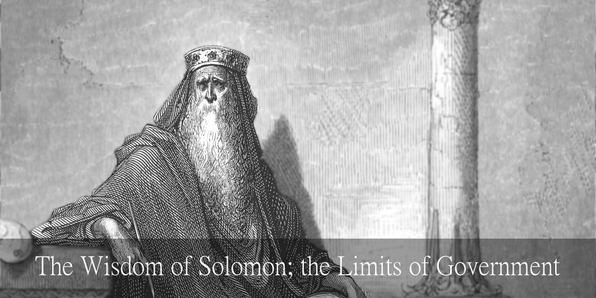Can we do this? Are we able to use our best knowledge, our most powerful mathematics, and our most enlightened elites, to design models that will overcome the ills and press for efficiencies in every corner of society? It’s a tempting thought: Use the power of statistical analysis, of mathematical modeling, to accurately quantify all known variables, and then predict the outcome of a particular policy that will benefit the most people.
We live in a generation of materialism. Not just the surface materialism of a young man wanting the flashiest car or a young lady wanting all the designer shoes and purses, but the deep materialism which refuses to know anything except that which is of this material world. Matter and energy, that is all we can know in our physical world. Anything beyond matter and energy, we can’t observe with our eyes, nor hear with our ears, and we certainly can’t count it up and control it with our scientific observations.
So materialism leaves us with what we can quantify and control in our physical world. Humans, too, are reduced to physical beings (which they are, to be sure, but are they something more, too?). Understanding everything according to materialism gives us much power. Using our math and physical sciences, we can understand and quantify everything in our society, so that when something goes wrong, we just adjust the variables to get a better outcome—the optimum outcome. In this way, any engineer, statistician, or economist quickly learns in college the power of the mathematical regression.
Regression analysis allows the researcher (or policy maker) to line up all the variables of a particular problem (say, the problem of getting traffic across New York City, or the problem of educating every child, or of getting everyone to buy the acceptable food), and by analyzing changes and effects in historical data, we can then calculate what will happen when one or more of the variables is changed. This allows us to predict outcomes for proposed policies. And what sociologist is not more than willing to tell us how education will be improved if only we will spend more money on a particular program, or what economist will not quickly tell us how spending “x” number of dollars on this project will increase employment by “y” percent? If we want people to eat more “good” food, just tax the “bad” food today, subsidize the “good,” and everyone will be healthy tomorrow.
But the predictions don’t always come true. Sometimes they do. But when predictions come true only sporadically, that’s not prediction, it’s happenstance. So what are we actually able to do with math? Mathematical regressions are powerful, to be sure. Engineers and scientists use them to much benefit. But they are dealing in the physical world, with physical things like steel and concrete, water and energy. But can you design societies, model whole economies, predict the outcomes, and forecast human actions?
King Solomon had one of the great economies of world history (930-970 BC). His kingdom stretched from Egypt up into modern day Syria; it included political power reaching into the area of modern day Iraq. He established a shipping industry which traded in ports along North Africa, and very likely even over to Spain. His building projects, political and military alliances, and trading partnerships brought unheard of economic wealth to Israel. Solomon’s was a strong economy that was to endure until his son Rehoboam destroyed the kingdom. Upon assuming the throne, Rehoboam determined to raise taxes on the citizenry by demanding more labor, and ended up splitting the kingdom in two with his oppression.
In building the kingdom, Solomon knew how to use numbers, how to quantify goods and labor and use them efficiently. The accounting Scripture gives of the gold and silver, of the lumber brought from the North, of the hundreds of thousands of bushels of wheat and millions of gallons of olive oil used in trade, of three year circuits of shipping transits used for international commerce, of the great construction projects, boggles the mind. Solomon was concerned with the economic production of the nation, knowing that a king benefits his nation when he is committed to a productive economy—“cultivated fields,” in Solomon’s words (Ecclesiastes 5:9).
Solomon oversaw great growth in the economic strength of Israel. But later in life, with the benefit of hindsight (he wrote the book of Ecclesiastes as an old man, looking back over a lifetime of achievements), he became concerned with the impossibility of using numbers for things they are not able to do, and with the problems of designing programs to control a nation.
“That which is crooked is not able to be straightened,” said Solomon, “and that which is deficient is not able to be quantified” (Ecclesiastes 1:15 ). Is Solomon not at least somewhat autobiographical here? Had he seen the vain attempts not only of other governments, but also his own? “I saw all the oppressions that are done under the sun,” said Solomon, using a Hebrew word for oppression that refers to the exploitation of the poor, “and behold, the tears of the oppressed, and behold, they had no one to comfort them. On the side of their oppressors there was power, and there was no one to comfort them” (Ecclesiastes 4:1). What oppression had Solomon seen even in his own kingdom as he was building up the great programs?
Yet, despite the vanity of it all, the pursuit of the fixing every problem, of “straightening the crooked,” of pursuing a utopia, never ends. “I turned my heart,” says Solomon, “to searching out … the scheme of things” (Ecclesiastes 7:25). The word Solomon uses here for scheme comes from the root word that refers to weaving things together—a tapestry. There is here the idea of constructing intricate patterns and complex systems. This is done with numbers, by quantifying what is known, designing, and forecasting what is expected, “adding one thing to another to find the scheme” (Ecclesiastes 7:27). Could the wise king not as easily have said, “Quantifying all known variables to determine the system”? And there we have our modern mathematical regressions designing great programs.
But the great programs won’t work because control and prediction of people and human societies is outside the realm of mathematics. For while math can quantify all known variables and bring them under control, there is something it can neither quantify nor control: the human person; the creativity, the imagination of the person; a person’s exercise of his own talents and vocational gifts which could never have been predicted.
If a king—a government—can’t control all the variables, and is unable to design a system that will find the optimum efficiency for all factors and persons in the land, then what is a government to do? Just sit back and let people starve? Is there a positive program to pursue?
There is. The king, the government, is given a very definite, positive program: Protect the institutions. The institutions set all things in place for a healthy society, for a functioning economy without oppression. These institutions are those things established by the Lord in his Commandments. The government is given to be concerned with the things of the Second Table of the Law. Institution #1: Family and home (Commandment 4). Institution #2: Life and legitimacy of the person, protection of neighbor (Commandment 5). Institution #3: Marriage of Man and Woman, respect and honor for chaste and pure lives. Institution #4: Private property, wealth, and possessions (Commandment 7). Institution #5: Establishment of just courts, justice against slander and corruption, protection of contracts (Commandment 8). Institution #6: House and home, farm and ranch, property and business (Commandments 9-10).
This gives a government more than enough to do. It’s a matter of “wielding the sword” for justice. But that’s a lot easier, and more reasonable, for a government to do than pursuing a utopia by designing great systems to address every ill, garnering more and more power along the way. As Solomon looks back on his reign, he sees his failures and overreaches, and is able to say, “This is the end of the matter, all has been heard: Fear God and guard his commandments, for this is the whole duty of man” (Ecclesiastes 12:14).



 RSS Feed
RSS Feed
